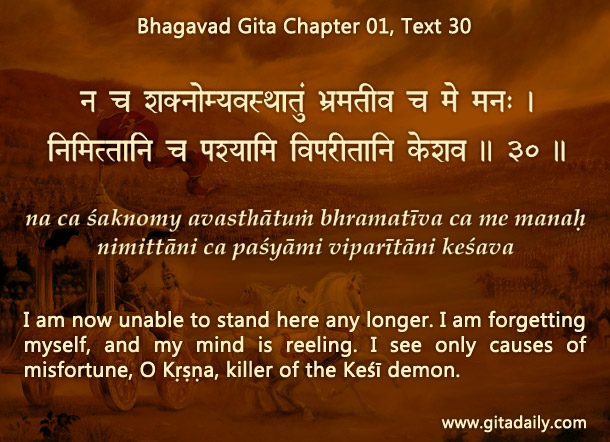The Bhagavad-gita is widely known as a book of profound philosophy. Why does such a book start with an entire chapter whose content is largely historical: for example, tongue-twisting names of various warriors in a particular ancient war?
To understand why the Gita’s first chapter matters, consider an acronym QUEST:
Quandary: Our life is shaped significantly by our decisions. And the situations that pose the greatest decision-making challenges are often those where we just can’t figure out what to do. The Gita’s battlefield setting in the first chapter highlights Arjuna’s ethical quandary, which leaves him mentally reeling (01.30).
Universality: The specificity of the battlefield setting highlights the universal human question: what really matters in life? For example, are possessions acquired at the cost of relations worth the price? (01.32-35)
Emergency: We often think that emergencies require immediate action, but they may also require a deep humility to evaluate whether we know what to do and seek guidance when we don’t. Arjuna’s situation in facing a war whose ethical boundaries seem ambiguous (01.46) is like that of a doctor facing a critical patient whose problem is not clearly identifiable.
Sorrow: Sorrow is often the strongest spur for spiritual seeking. The Gita’s vivid description of Arjuna’s agony (01.28-29) suggests that its message is meant to be not just philosophical (analyzing big questions), but also therapeutic (addressing a battered heart).
Thoughtfulness: Arjuna articulates several ethical concerns about the war, which include its possible ramifications for future generations (01.37-43) and which exclude any fear of his own death. Rather than choking under pressure, he is contemplating amid pressure, thus demonstrating his readiness for receiving and assimilating the Gita’s wisdom.
One-sentence summary:
The Gita’s first chapter illustrates how real-life challenges can serve as a launching pad for exploring life’s big questions.
Think it over:
- Why does the Gita’s first chapter matter?
- Did any of the elements of the QUEST acronym prompt your spiritual quest?
- Which of these elements can you use to power your present Gita study?
***
01.30: I am now unable to stand here any longer. I am forgetting myself, and my mind is reeling. I see only causes of misfortune, O Krishna, killer of the Keshi demon.
To know more about this verse, please click on the image


Leave A Comment